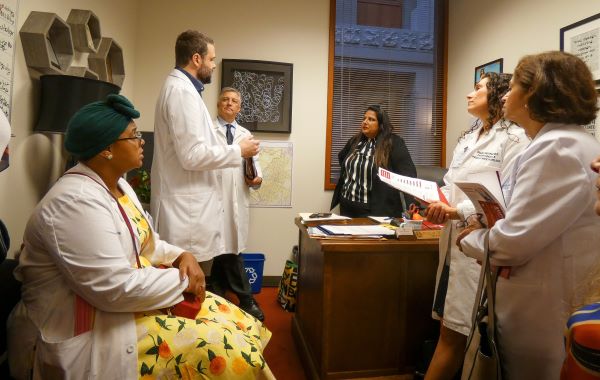
Priority: Pursue comprehensive prior authorization reform and cut down on other burdensome health plan/Medicaid practices that contribute to rising health care costs, threaten the viability of independent medical practices, and compromise patient care.
Background: For Austin cancer specialist Debra Patt, MD, prior authorization “is a barrier in every aspect of what I do. From a patient perspective, it just makes this complicated cancer ecosystem much more complicated to navigate.”
Even after the passage of a landmark 2021 Texas “gold carding” law that was directed at giving physicians some relief, challenges remain, the past chair of Texas Medical Association’s Council on Legislation told Texas Medicine.
“The prior auth environment has gotten more hostile since that time. It has not gotten easier,” Dr. Patt said.
In a 2023 American Medical Association survey, 93% of physicians reported prior authorization negatively impacted clinical outcomes, with nearly one in four saying the process led to serious adverse events ranging from hospitalization to death.
Under the 2021 Texas gold card law, physicians who receive at least 90% approval on prior authorization requests for a specific service or prescription from a state-regulated health plan covered by the law can bypass the prior authorization process for that service, helping to avoid delays to medically necessary care. Even with this legislative step forward, however, prior authorization demands remain high.
Dr. Patt is still writing letters of medical necessity and going through peer-to-peer reviews to advance her recommended treatment. The prior authorization process has even infringed on her interactions with patients.
During life-changing interactions with patients newly learning they have cancer or needing to start chemotherapy, “I’m being pulled out of that conversation to manage a discussion with the insurance company to get something for some other patient covered. It’s very disruptive,” she said.
While inspiring other states to pass their own similar gold card laws, the Texas law has had challenges in its implementation.
“The regulations that subsequently followed the bill made it probably more burdensome” than the legislature intended, said Zeke Silva, MD, TMA Council on Legislation chair.
Prior authorization tops several insurance barriers TMA will address in the 2025 session.
Also topping the list: uncertainty and administrative and financial difficulties for physicians and patients participating in the Texas Medicaid program or the Children’s Health Program (CHIP), which are conducting staggered eligibility redeterminations for those whose coverage was continuously maintained throughout the COVID-19 public health emergency. Typically, eligibility redeterminations occur every six months in Medicaid, and 12 months for CHIP.
Patients’ ability to navigate the renewal of the redetermination process is further complicated by state managed care re-contracting that could require 43% of the state’s total CHIP and State of Texas Access Reform Medicaid program population to switch to a different managed care organization. As of this writing, a judge had put the re-contracting on pause.
Some doctors report challenges resulting from people losing Medicaid or CHIP coverage in the unwinding and in intervening to try to re-enroll patients in the appropriate program.
Sheila Magoon, MD, works with pediatric clinics in the Rio Grande Valley that have had to inform families that they no longer had Medicaid coverage they believed they did.
“If we think creatively, there are ways to go back out and touch this population and make sure those that should be on the rolls are re-enrolled, so we can get them covered and get them access to the care they need,” said the member of TMA’s Committee on Medicaid, CHIP, and the Uninsured.
Solutions: When it comes to administrative burdens caused by health plans, TMA will call attention this session to physicians’ “greater desire to take care of patients and not process paperwork,” and to patients for whom such barriers are “delaying care. It’s leading to poor outcomes,” Dr. Silva said.
The association remains focused on comprehensive prior auth reform. At the same time, TMA’s Director of Public Affairs Ben Wright says Rep. Greg Bonnen, MD (R-Friendswood) is expected to re-introduce a bill similar to his House Bill 4343 in 2023, which is designed to “build on the 2021 gold carding law framework and promote the law being implemented as it was originally intended” with additional transparency and accountability standards for insurers.
Opportunities also exist to streamline prior auth for cancer treatments and chronic conditions similar to what 2023’s House Bill 755 did for some autoimmune diseases and blood disorder drugs.
Another way TMA is amplifying its agenda is in joining the Texas Coalition for Patients, a coalition of patient advocates, physicians, and medical groups formed to elevate patient voices to legislators on a range of insurance issues. Those include prior auth reform, requiring health plan peer reviewers to sign denial letters, and prohibitions against health plans using third-party vendors to deny care.
Similarly, TMA’s Committee on Medicaid, CHIP, and the Uninsured convened a workgroup to develop recommendations on how to simplify enrollment problems impacting patients as well as enrollment and credentialing challenges that physicians face.
TMA presented testimony to the House Committee on Human Services in June, calling for greater transparency in the Medicaid re-contracting process and minimizing disruption for families affected in the unwinding, saying it is “committed to working collaboratively with [lawmakers] and other stakeholders to ensure that Texas’ Medicaid program continues to serve the needs of our most vulnerable populations effectively.”
TMA’s Top 10 Priorities for the 2025 Legislative Session
Phil West
Associate Editor
(512) 370-1394
phil.west[at]texmed[dot]org

Phil West is a writer and editor whose publications include the Los Angeles Times, Seattle Times, Austin American-Statesman, and San Antonio Express-News. He earned a BA in journalism from the University of Washington and an MFA from the University of Texas at Austin’s James A. Michener Center for Writers. He lives in Austin with his wife, children, and a trio of free-spirited dogs.